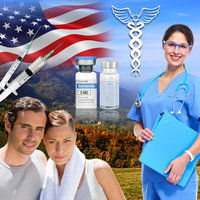Introduction
Testosterone Deficiency Syndrome (TDS), also known as hypogonadism, is a medical condition characterized by low levels of testosterone in males, leading to a variety of symptoms including decreased libido, fatigue, and mood disturbances. Recent studies have begun to explore the potential role of environmental chemicals, such as phthalates, in contributing to this condition. This article delves into the influence of phthalates on testosterone levels and their possible connection to TDS among American males.
Understanding Phthalates
Phthalates are a group of chemicals widely used in the manufacturing of plastics and other consumer products. They are found in everything from food packaging and toys to cosmetics and medical devices. Due to their widespread use, phthalates are ubiquitous in the environment and have been detected in the bodies of nearly all Americans, according to the Centers for Disease Control and Prevention (CDC).
The Mechanism of Phthalate Exposure
Exposure to phthalates occurs primarily through ingestion, inhalation, and dermal contact. Once absorbed, phthalates can disrupt the endocrine system, which is responsible for regulating hormones, including testosterone. Research indicates that phthalates can interfere with the production and function of testosterone by acting as endocrine disruptors.
Phthalates and Testosterone Levels
Several studies have investigated the relationship between phthalate exposure and testosterone levels in males. A notable study published in the journal "Environmental Health Perspectives" found that higher levels of certain phthalate metabolites in urine were associated with lower testosterone levels in adult men. This suggests that phthalates may contribute to the development of TDS by reducing testosterone production.
Clinical Implications for American Males
The prevalence of TDS among American males is a growing concern. According to the American Urological Association, approximately 20% of men over the age of 60 suffer from low testosterone levels. Given the widespread exposure to phthalates, it is crucial to consider the potential role of these chemicals in the increasing incidence of TDS.
Managing Exposure to Phthalates
Reducing exposure to phthalates can be challenging due to their pervasive nature. However, some practical steps can be taken to minimize contact. These include avoiding plastic food containers, choosing phthalate-free personal care products, and reducing the use of vinyl flooring and other phthalate-containing materials in the home.
The Role of Healthcare Providers
Healthcare providers play a vital role in identifying and managing TDS in American males. Routine screening for testosterone levels, particularly in men presenting with symptoms of TDS, can help in early diagnosis and intervention. Additionally, educating patients about the potential risks associated with phthalate exposure and providing guidance on minimizing contact with these chemicals can be beneficial.
Future Research Directions
Further research is needed to fully understand the impact of phthalates on testosterone levels and TDS. Longitudinal studies that track phthalate exposure and testosterone levels over time could provide more definitive evidence of causality. Additionally, investigating the mechanisms by which phthalates affect testosterone production at a molecular level could lead to the development of targeted interventions.
Conclusion
The influence of phthalates on testosterone levels and their potential contribution to Testosterone Deficiency Syndrome in American males is an emerging area of concern. While more research is needed to establish a definitive link, the existing evidence suggests that reducing exposure to these ubiquitous chemicals may help in maintaining healthy testosterone levels. As awareness grows, it is essential for both individuals and healthcare providers to take proactive steps in addressing this issue.
Contact Us For A Fast And Professional Response

- Understanding Testosterone Deficiency: Symptoms, Diagnosis, and Treatment for American Men [Last Updated On: March 1st, 2025] [Originally Added On: March 1st, 2025]
- Testosterone Deficiency Impact on Muscle Mass in American Men: Diagnosis and Treatment [Last Updated On: March 17th, 2025] [Originally Added On: March 17th, 2025]
- Environmental Toxins Linked to Testosterone Deficiency in American Males [Last Updated On: March 17th, 2025] [Originally Added On: March 17th, 2025]
- Alcohol's Impact on Testosterone and TDS in American Males: A Comprehensive Analysis [Last Updated On: March 18th, 2025] [Originally Added On: March 18th, 2025]
- Testosterone Deficiency Syndrome: Symptoms, Diagnosis, and Management Strategies for American Men [Last Updated On: March 18th, 2025] [Originally Added On: March 18th, 2025]
- Testosterone Deficiency Syndrome: Impact on Energy and Treatment Options for American Men [Last Updated On: March 18th, 2025] [Originally Added On: March 18th, 2025]
- Stress-Induced Testosterone Deficiency in American Males: Causes, Effects, and Management [Last Updated On: March 19th, 2025] [Originally Added On: March 19th, 2025]
- Smoking's Impact on Testosterone Deficiency in American Males: Mechanisms and Mitigation [Last Updated On: March 20th, 2025] [Originally Added On: March 20th, 2025]
- Testosterone Deficiency Syndrome: Understanding and Managing with Hormone Therapy [Last Updated On: March 20th, 2025] [Originally Added On: March 20th, 2025]
- Testosterone Deficiency in Men: Symptoms, Prostate Health, and Treatment Options [Last Updated On: March 20th, 2025] [Originally Added On: March 20th, 2025]
- Testosterone Deficiency in American Men: Impacts on Mood and Treatment Options [Last Updated On: March 20th, 2025] [Originally Added On: March 20th, 2025]
- Weight Training Benefits for Men with Testosterone Deficiency Syndrome [Last Updated On: March 21st, 2025] [Originally Added On: March 21st, 2025]
- Chronic Illness Impact on Testosterone Levels in American Males: Management Strategies [Last Updated On: March 22nd, 2025] [Originally Added On: March 22nd, 2025]
- Testosterone Check-ups Crucial for American Males to Combat Deficiency Syndrome [Last Updated On: March 22nd, 2025] [Originally Added On: March 22nd, 2025]
- Testosterone Deficiency and Sleep Apnea: A Bidirectional Health Challenge for American Males [Last Updated On: March 22nd, 2025] [Originally Added On: March 22nd, 2025]
- Vitamin D's Role in Managing Testosterone Deficiency in American Males [Last Updated On: March 23rd, 2025] [Originally Added On: March 23rd, 2025]
- Testosterone Deficiency and Joint Health: Insights for American Males [Last Updated On: March 23rd, 2025] [Originally Added On: March 23rd, 2025]
- Magnesium's Role in Managing Testosterone Deficiency Syndrome in American Males [Last Updated On: March 23rd, 2025] [Originally Added On: March 23rd, 2025]
- Testosterone Deficiency Syndrome and Immune Function in American Men: A Comprehensive Overview [Last Updated On: March 23rd, 2025] [Originally Added On: March 23rd, 2025]
- Testosterone Deficiency Impacts Body Composition in American Males: Muscle, Fat, Bone [Last Updated On: March 24th, 2025] [Originally Added On: March 24th, 2025]
- Testosterone Deficiency Syndrome: Impacts on Skin Health and Management Strategies for American Men [Last Updated On: March 24th, 2025] [Originally Added On: March 24th, 2025]
- Soy Consumption and Testosterone Levels in American Males with TDS: A Complex Relationship [Last Updated On: March 24th, 2025] [Originally Added On: March 24th, 2025]
- Testosterone Deficiency Syndrome: Impacts and Management in American Male Athletes [Last Updated On: March 24th, 2025] [Originally Added On: March 24th, 2025]
- Shift Work's Impact on Testosterone Levels and Deficiency Syndrome in American Males [Last Updated On: March 24th, 2025] [Originally Added On: March 24th, 2025]
- Zinc's Vital Role in Combating Testosterone Deficiency in American Men [Last Updated On: March 24th, 2025] [Originally Added On: March 24th, 2025]
- Testosterone Deficiency Linked to Dental Health Issues in American Males [Last Updated On: March 24th, 2025] [Originally Added On: March 24th, 2025]
- Testosterone Deficiency in American Men: Impacts on Vision and Eye Health [Last Updated On: March 24th, 2025] [Originally Added On: March 24th, 2025]
- Testosterone Deficiency Syndrome: Impact on Cognitive Function in American Men [Last Updated On: March 25th, 2025] [Originally Added On: March 25th, 2025]
- Plasticizers' Impact on Testosterone Levels and TDS in American Men: A Review [Last Updated On: March 25th, 2025] [Originally Added On: March 25th, 2025]
- Testosterone Deficiency and Depression: A Critical Link in American Men's Health [Last Updated On: March 25th, 2025] [Originally Added On: March 25th, 2025]
- Omega-3 Fatty Acids: A Natural Approach to Managing Testosterone Deficiency in Men [Last Updated On: March 25th, 2025] [Originally Added On: March 25th, 2025]
- Testosterone Deficiency and Hair Loss: Understanding and Managing in American Men [Last Updated On: March 25th, 2025] [Originally Added On: March 25th, 2025]
- Pesticide Exposure Linked to Low Testosterone in American Men: Health Risks and Mitigation [Last Updated On: March 25th, 2025] [Originally Added On: March 25th, 2025]
- Air Pollution's Impact on Testosterone Levels in American Males: A Growing Concern [Last Updated On: March 26th, 2025] [Originally Added On: March 26th, 2025]
- Testosterone Deficiency Syndrome and Its Link to Hearing Loss in American Males [Last Updated On: March 26th, 2025] [Originally Added On: March 26th, 2025]
- Testosterone Deficiency and Anemia: Impacts and Management for American Males [Last Updated On: March 26th, 2025] [Originally Added On: March 26th, 2025]
- Testosterone Deficiency in American Males: Impacts on Memory and Cognitive Health [Last Updated On: March 26th, 2025] [Originally Added On: March 26th, 2025]
- Fenugreek: A Natural Solution for Testosterone Deficiency Syndrome in American Males [Last Updated On: March 26th, 2025] [Originally Added On: March 26th, 2025]
- Blue Light Exposure Linked to Testosterone Deficiency in American Men: Mitigation Strategies [Last Updated On: March 26th, 2025] [Originally Added On: March 26th, 2025]
- Chronic Stress and Testosterone Deficiency Syndrome in American Males: Impacts and Management [Last Updated On: March 26th, 2025] [Originally Added On: March 26th, 2025]
- Diet Soda Consumption Linked to Lower Testosterone Levels in American Men [Last Updated On: March 26th, 2025] [Originally Added On: March 26th, 2025]
- Testosterone Deficiency and Thyroid Dysfunction: Interconnected Health Issues in American Males [Last Updated On: March 26th, 2025] [Originally Added On: March 26th, 2025]
- Boron Supplementation: A Natural Approach to Managing Testosterone Deficiency in American Males [Last Updated On: March 27th, 2025] [Originally Added On: March 27th, 2025]
- Ashwagandha's Potential in Boosting Testosterone for American Males with TDS [Last Updated On: March 27th, 2025] [Originally Added On: March 27th, 2025]
- Testosterone Deficiency in American Men: Impacts, Diagnosis, and Treatment Options [Last Updated On: March 27th, 2025] [Originally Added On: March 27th, 2025]
- High-Fat Diets and Testosterone Levels: Impacts and Dietary Recommendations for American Males [Last Updated On: March 27th, 2025] [Originally Added On: March 27th, 2025]
- Testosterone Deficiency and Liver Health in U.S. Males: Impacts and Management Strategies [Last Updated On: March 28th, 2025] [Originally Added On: March 28th, 2025]
- TDS and Gallbladder Disease: Insights, Risks, and Management Strategies for American Males [Last Updated On: March 28th, 2025] [Originally Added On: March 28th, 2025]
- Testosterone Deficiency Syndrome: Impacts on Kidney Function and Management Strategies [Last Updated On: March 29th, 2025] [Originally Added On: March 29th, 2025]
- Testosterone Deficiency Syndrome: Impacts on Pancreatic Health and Cancer Risk in Men [Last Updated On: March 30th, 2025] [Originally Added On: March 30th, 2025]
- Heavy Metal Exposure and Its Impact on Testosterone Levels in American Men [Last Updated On: March 30th, 2025] [Originally Added On: March 30th, 2025]
- EMF Exposure and Testosterone Levels: Implications for TDS in American Males [Last Updated On: March 31st, 2025] [Originally Added On: March 31st, 2025]
- Tribulus Terrestris: A Promising Herbal Aid for Testosterone Deficiency in American Males [Last Updated On: April 1st, 2025] [Originally Added On: April 1st, 2025]
- Testosterone Deficiency Syndrome: Adrenal Health's Role and Management Strategies [Last Updated On: April 2nd, 2025] [Originally Added On: April 2nd, 2025]
- Testosterone Deficiency Syndrome: Impact, Diagnosis, and Management in American Men [Last Updated On: April 3rd, 2025] [Originally Added On: April 3rd, 2025]
- Noise Pollution Linked to Testosterone Deficiency in American Males: A Growing Concern [Last Updated On: April 5th, 2025] [Originally Added On: April 5th, 2025]
- Fluoride Exposure and Its Impact on Testosterone Levels in American Men [Last Updated On: April 6th, 2025] [Originally Added On: April 6th, 2025]
- Testosterone Deficiency Syndrome: Impacts on Hypothalamic Function and Management Strategies [Last Updated On: April 8th, 2025] [Originally Added On: April 8th, 2025]
- Testosterone Deficiency Syndrome: Impacts, Diagnosis, and Treatment in American Males [Last Updated On: April 10th, 2025] [Originally Added On: April 10th, 2025]
- DHEA Supplementation: A Promising Treatment for Testosterone Deficiency Syndrome in American Males [Last Updated On: April 10th, 2025] [Originally Added On: April 10th, 2025]
- BPA Exposure Linked to Lower Testosterone and TDS in American Men: A Review [Last Updated On: April 10th, 2025] [Originally Added On: April 10th, 2025]
- Ginseng's Potential in Managing Testosterone Deficiency Syndrome: A Comprehensive Overview [Last Updated On: April 10th, 2025] [Originally Added On: April 10th, 2025]
- Testosterone Deficiency and Pineal Gland: Insights for American Males with TDS [Last Updated On: April 10th, 2025] [Originally Added On: April 10th, 2025]
- Testosterone Deficiency Syndrome: Impacts on Gastrointestinal Health in American Males [Last Updated On: April 13th, 2025] [Originally Added On: April 13th, 2025]
- Testosterone Deficiency in American Males: Impacts on Respiratory Health and Management Strategies [Last Updated On: April 13th, 2025] [Originally Added On: April 13th, 2025]

















